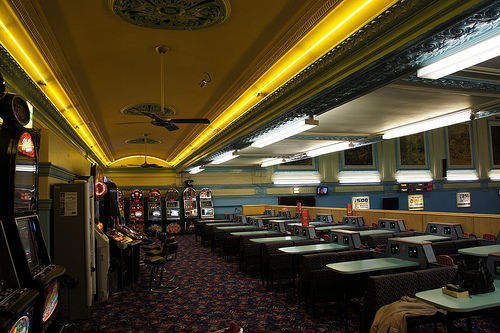The Bingo Hall was for generations of many women (and a few men) in the UK’s industrial towns an essential part of life. In particular, the post-war period saw Bingo becoming ever more popular, peaking in the early 1970s. And though the pastime was already in decline in its traditional form before the advent of online bingo, it remains important for many women of a certain age in particular.
Bingo was part of the very fabric of British working class life for so many people for so long, in fact, that the social shift caused by increased popularity of the online versions has threatened the very existence of the halls and many have closed down.

The fact is that the older generation of traditional bingo player is gradually dying out and the next generation don’t seem to want to follow in their parents’ footsteps. But the UK Bingo industry is doing all it can to fight back and there have been recent calls for Bingo companies to be granted increased support by the UK Government. In particular, the lobbyists want to see a fairer system of tax charges for Bingo operators.
In April, an all-party Parliamentary Bingo Group, which included 19 MPs and 48 members of the UK’s Bingo Association met to discuss the issues facing the industry.
The Bingo Association has been around since 1998 when the British Bingo Operators’ Association merged with the Bingo Association of Great Britain. It works with the operators and owners of Bingo clubs as well as government and policy-makers, industry regulators and others.
The Association would like to see a fairer tax regime which puts it on a par with bookmakers in the country. The Association says that this would, in fact, increase the net tax revenue to the exchequer.
As things stand, the UK’s Bingo industry is subject to what the Association sees as an inequitable tax regime. Bingo operators currently have to pay a tax rate of 20% of gross profits whereas taxes on all other forms of gambling (including both bookmakers’ shops and online Bingo providers are at 15%.
So not only are the traditional Bingo halls facing a fundamental socio-demographic shift which is very much not in their favor – but they’re also facing an increased tax burden to boot. This is contributing to the decline of the old Bingo halls which are closing at an average rate of one per month in the UK.
The UK’s Minister for Sport and Gambling acknowledges the importance of Bingo’s role in the very fabric of the life of local communities – and that this role should be recognised.
Quite whether we’ll see any kind of resurgence though, is another matter. Life has a habit of surprising us but it’s difficult to see how the traditional Bingo Halls of yesteryear can possibly compete in the online age in a game which is, ironically perhaps, booming.

